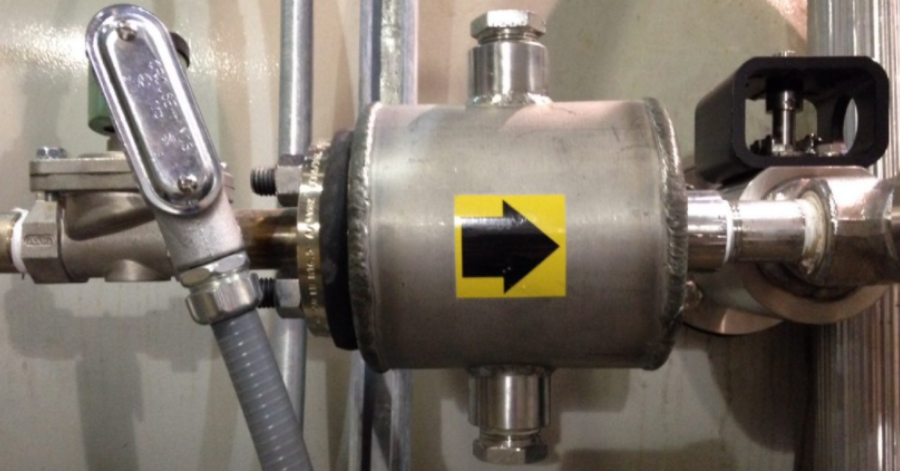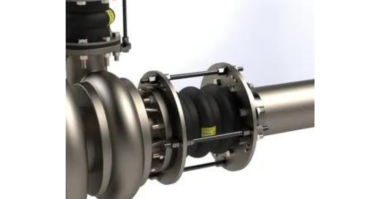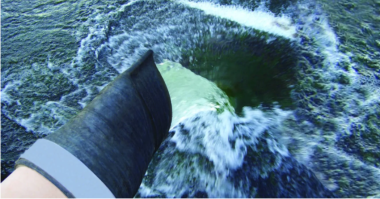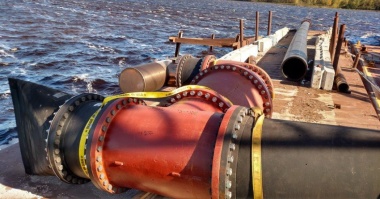Why Choose Check Valves
Check valves are commonly found in industries where fluids are pumped through piping systems. These are one-way, passive valves, ensuring the forward flow of fluids before closing to prevent backflow conditions.
Check valves are available in a wide range of materials, sizes, and styles including swing, ball, diaphragm, double-door, and duckbill types.
They are simply designed, using the flow velocity and pressure to open and close. When properly designed and operated they ensure fluid flows in the right direction while protecting the integrity of the system.
Check Valve Problems
A variety of issues can occur with check valves depending on their application, construction, and style. Steel flap, swing and double-door valves can rust, stick or become jammed with debris. When these valves fail, they allow backflow. Abrasive sludges or corrosive slurries can create wear and damage to valves, making them inoperable.
A major problem caused by poorly designed or operating check valves is valve slam and water hammer.
Valve Slam and Water Hammer
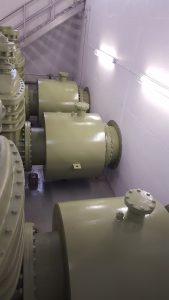 Valve slam, also called water hammer, occurs after a pump stops, when the flow reverses before the valve is completely closed. Once the valve closes, the sudden change in flow direction and velocity results in water hammer.
Valve slam, also called water hammer, occurs after a pump stops, when the flow reverses before the valve is completely closed. Once the valve closes, the sudden change in flow direction and velocity results in water hammer.
Water hammer occurs when a fluid in motion is suddenly forced to stop. The flow of fluid at the leading edge stops, but fluid behind continues to move and compresses. The kinetic energy of the fluid converts to pressure energy that creates a hydraulic shock wave that travels at nearly the speed of sound through the pipeline.
Water hammer is a destructive force, causing major damage to pumps, equipment, and piping systems. The problem is exacerbated for systems pumping at high pressures and velocities, especially those pumping abrasive or thick materials. Consequences of water hammer include ruptured pipes, valves or fittings and destroyed foundations, pumps, and instruments. The results of water hammer also pose a safety hazard to personnel.
Related problems include environmental and property damage caused by resulting leaks and spills, as well as potential regulatory fines and bad press.
Using the right check valve for a specific application can eliminate this dangerous and expensive problem.
Abrasive Materials and High Velocities Effect on Check Valves
Abrasive materials like raw sewage and sludge pose special challenges for check valves. Even greater problems are caused in systems with materials that may be both abrasive and corrosive, such as lime slurries, mine tailings and tar sands.
Swing, double-door, and inline steel-bodied check valves may not close properly due to solids in the material. They also experience worn elastomers and seat seals, wearing out quickly due to abrasive or corrosive exposure. Corrosion may cause the valve to stick in an open position.
In addition, due to the high velocities and pressures often used for pumping these materials, destructive water hammer is a common occurrence with these valves.
Elastomeric Check Valves Provide Solutions
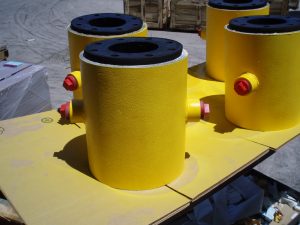 PROCO’s ProFlex™ 750 jacketed in-line flanged rubber check valve is perfect for heavy-duty wastewater, sludge, and slurry applications. The enclosed body check valve has no mechanical parts to wear, corrode or stick. They require no external power sources required, so operation costs are non-existent.
PROCO’s ProFlex™ 750 jacketed in-line flanged rubber check valve is perfect for heavy-duty wastewater, sludge, and slurry applications. The enclosed body check valve has no mechanical parts to wear, corrode or stick. They require no external power sources required, so operation costs are non-existent.
Elastomeric check valves are cost-effective and flexible, allowing abrasive materials to easily flow through the valve without significant head losses. The valve seals around any solids trapped inside and prevents sewage, sludge, mine trailings, or tar sands from coming back through the pipeline.
The ProFlex™ 750 can be installed horizontally or vertically and is designed within industry standards for flange size and drilling.
Eliminating Water Hammer
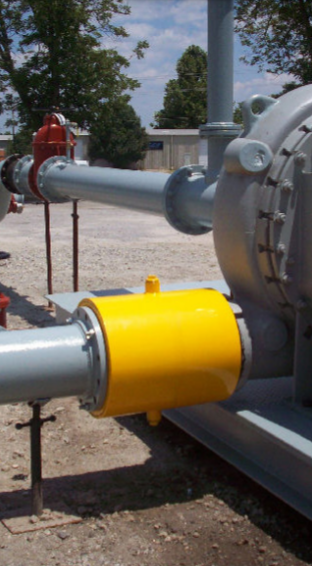 Most importantly, the rubber duckbill design of the ProFlex™ 750 prevents valve slam and water hammer, even in systems with velocities of over eight feet per second.
Most importantly, the rubber duckbill design of the ProFlex™ 750 prevents valve slam and water hammer, even in systems with velocities of over eight feet per second.
A duckbill check valve is a one-piece elastomeric sleeve shaped like a duck’s beak. It allows the forward flow of water with positive differential pressure which progressively opens the valve as flow increases. Reverse differential pressure closes the valve. The ProFlex™ 750 features a full port design that opens with minimal head pressure and closes with any back pressure on the valve.
Rubber absorbs a certain amount of energy, and even with high velocities the two rubber faces coming together prevent the hydraulic shock of water hammer.
As an example, the Jimmy Smith Wastewater Treatment Plant in Boone, North Carolina experienced severe and destructive water hammer with the 16-inch swing check valves on their three influent pumps. The treatment plant sits at an elevation of 3,300 feet and the influent station pumps uphill 80 feet to the plant. The three pumps are connected to a common header. Reverse flow from a high elevation and a pump coming on at the same time created violent hydraulic shock waves.
At one point, a severe water hammer ruptured the pipe, filling the pump room with raw sewage. After a second violent water hammer destroyed the check valve on a newly rebuilt pump, the plant’s sales representative recommended the PROCO ProFlex™ 750. Since the ProFlex™ 750 was installed on May 13, 2013 there have been no more water hammer issues with the pump.
In another instance, water hammer on a 30-inch valve was so destructive that it broke the concrete wall where the pipe entered the building. Replacing the valve with a ProFlex™ 750 resolved the problem.
Additional Benefits
While eliminating water hammer and handling abrasive materials are critical for many municipal
and industrial applications, the ProFlex™ 750 provides additional benefits.
Maintenance-Free Long Life and Ease of Replacement
Corrosive materials, abrasive solids and debris cause flap, swing, and double-door check valves to rust, bind, seize, wear, and become inoperable. Maintenance on these types of valves can be expensive, difficult, and pose safety issues for personnel.
All ProFlex™ valves are made with the highest grade of elastomers, known to have a service life of 35 to 50 years. ProFlex™ rubber check valves can be manufactured out of different elastomers to withstand almost any type of media. The durable, all-elastomeric construction of the ProFlex™ valves provides 100 percent resistance to abrasive or corrosive wastewaters, sludges and slurries. ProFlex™ check valves are algae, barnacle and fire resistant, and there is nothing to rust or degrade on the ProFlex™ valves.
In the unlikely event that a replacement is needed, the inner sleeve on the ProFlex™ 750 is a standard ProFlex™ 710 rubber check valve. The pull-through design allows for quick, easy installation and provides a tamper-proof valve to address Homeland Security issues.
Flush Ports to Clean Out Sediment
As sewage or slurry comes to a halt, solids may settle around the jacket, possibly affecting proper flow. The ProFlex™ 750 comes with two flush ports—one on top and one on the bottom. This allows maintenance staff to quickly flush out sediment without having to take the valve offline or perform expensive maintenance to clean out the valve. The ProFlex™ 750 also improves personnel safety by eliminating the need to remove the valve. Employees can avoid contact with the potentially hazardous sewage or slurry.
Options for Body Materials
The ProFlex™ 750’s carbon steel body with epoxy coating and one-piece rubber valve is exceptionally durable. Optional body materials are available as well. However, the inside jacket is exposed to the same media as the valve.
Processes that move sludge or slurry with high pressure through high-velocity pipe encourage abrasion. Rubber-lined jackets are available to extend wear life in abrasive or corrosive applications. PROCO installs the rubber lining using a glued-on process heated within an autoclave to inherently bond the rubber to the inside of the jacket.
Withstands Temperature Variation
PROCO’s rubber check valves can withstand temperatures ranging from -65 to +400° F depending on the specified elastomer. The valves will not warp or freeze and can be used in nearly any weather conditions and with materials that generate heat. Under highly unusual conditions, if the ProFlex™ valve should freeze, it will not be damaged and will return to normal operation upon thaw.
Quiet Operation
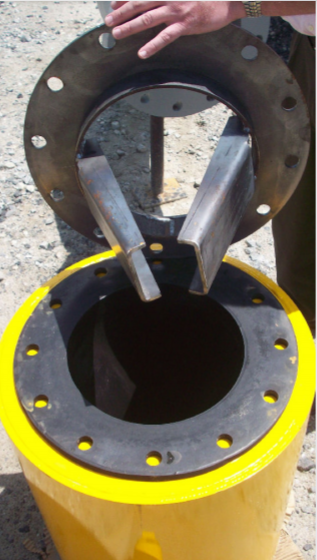 With no metal flaps or gates, and the elimination of water hammer, there is no loud banging. The ProFlex™ 750 is perfect for use near residential areas or other locations where noise abatement is required.
With no metal flaps or gates, and the elimination of water hammer, there is no loud banging. The ProFlex™ 750 is perfect for use near residential areas or other locations where noise abatement is required.
Customized Solutions for Difficult Applications
Pumping abrasive, corrosive materials, especially at high pressure and velocity creates special challenges. PROCO’s ProFlex™ 750 jacketed in-line flanged rubber check valves can eliminate the destructive force of water hammer. At the same time, they provide cost-effective, maintenance-free operation for these critical pumping scenarios.
PROCO also provides customization for specific applications, especially those used in existing operations. A variety of elastomers are available, including ANSI/NSF-61 certification for potable water applications.
The valve jacket is typically constructed of carbon steel, but optional materials are available. And the wide range of sizes are also available with a special inside diameter to suit concrete pipe.
All PROCO valves are constructed based on specific details of the application provided by the customer. And in most cases, PROCO can fabricate a special design for unusual requirements.
The ProFlex™ 750 is a unique and versatile solution to problems encountered in many municipal and industrial operations.

